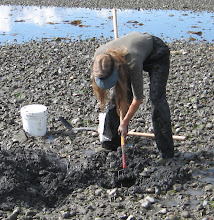http://www.latimes.com/news/printedition/front/la-na-ichfish15-2008jun15,0,2020280.story
Authors of this blog operated a commercial fishing vessel in Alaska's Yukon delta for most of the last 20 years. The month or two each year we devoted to harvest of Yukon chinooks provided our chief source of income, wonderful food for our table, and great joy. We shared the resource with hundreds of Alaska Native fishing families who converged on the river each June to erect their tents and fish-drying and net-mending racks in a seasonal ritual that likely extends back to the time when mammoths grazed on this Bering Sea coast. Last year, with much regret, we sold our last limited entry gillnet permit and boat. This year the return of the Yukon River's great salmon has been so low that no commercial fishing has been allowed and even the subsistence fishing has been greatly curtailed.

This latest report from the Alaska Department of Fish & Game tells the story of the struggle to manage a diminishing resource. http://csfish.adfg.state.ak.us/newsrelease/view.php?dist=YUS&year=2008&species=400&num=18&printable=1
With boat gas selling for $8/gallon and no income from commercial fishing, Yukon River fishing families are facing hard times. Governor Palin's plan to give each Alaskan a $1,200 check to help with sky-rocketing energy costs is a vitally needed first step, but more will be needed as Alaskans throughout the state seek to adjust to global changes.




No comments:
Post a Comment